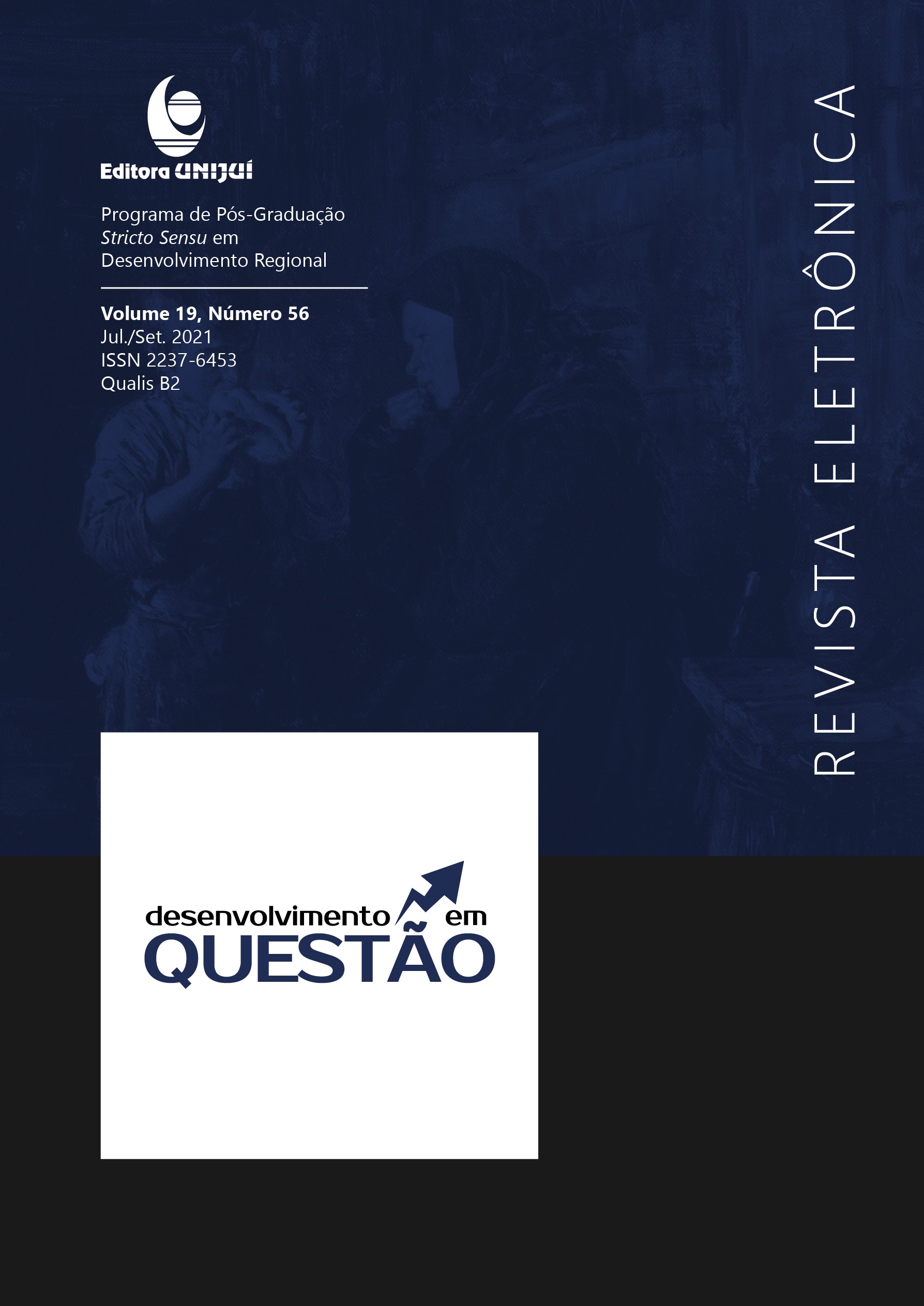Inovação no Desenvolvimento Rural e Regional: O Caso das Novidades Multidimensionais das Agroindústrias Familiares
INNOVATION IN DEVELOPMENT RURAL AND REGIONAL: THE CASE OF MULTIDIMENSIONS NOVELTIES IN THE FAMILY AGROINDUSTRIES
DOI :
https://doi.org/10.21527/2237-6453.2021.56.11734Mots-clés :
Novidades. Alimentação. Agroindústrias familiares. Desenvolvimento regional e rural.Résumé
A pesquisa buscou identificar e analisar as motivações e os diferentes tipos de novidades nos sistemas produtivos e nas agroindústrias familiares e seus efeitos nas famílias e nos processos de desenvolvimento rural e regional. A metodologia foi desenvolvida com base em dados qualitativos e quantitativos, principalmente entrevistando agricultores (quatro), técnicos e agentes de desenvolvimento rural (oito), no Município de Verê/PR, em 2018. As abordagens teóricas utilizadas foram a Perspectiva Orientada ao Ator (POA) de Norman Long e a Perspectiva Multinível e Co-Evolucionária (PMN) de autores que trabalham com abordagens sociotécnicas. Esta pesquisa encontrou diferentes tipos de novidades, como: produtiva, tecnológica, organizacional, de construção de mercados e de sustentabilidade ambiental. Tais novidades garantiram uma melhor condição de vida e trabalho para as famílias estudadas e corroboraram para explicar sua permanência nas áreas rurais. Com essas novidades, os agricultores alcançaram um sistema de produção mais sustentável, com maior autonomia produtiva, comercial e financeira e, ao mesmo tempo, passaram a produzir alimentos mais saudáveis. No entanto, também foi observado que existem desafios à sedimentação de novidades, como: a incerteza na sucessão familiar, a continuidade da rede social dos atores e a dependência de políticas e ações públicas do Estado.
Téléchargements
Publié-e
Comment citer
Numéro
Rubrique
Licence
Ao publicar na Revista Desenvolvimento em Questão, os autores concordam com os seguintes termos:
Os trabalhos seguem a licença Creative Commons Atribuição 4.0 Internacional (CC BY 4.0), que permite:
Compartilhar — copiar e redistribuir o material em qualquer meio ou formato;
Adaptar — remixar, transformar e criar a partir do material para qualquer fim, inclusive comercial.
Essas permissões são irrevogáveis, desde que respeitados os seguintes termos:
Atribuição — Atribuição — os autores devem ser devidamente creditados, com link para a licença e indicação de eventuais alterações realizadas.
Sem restrições adicionais — não podem ser aplicadas condições legais ou tecnológicas que restrinjam o uso permitido pela licença.
Avisos:
A licença não se aplica a elementos em domínio público ou cobertos por exceções legais.
A licença não garante todos os direitos necessários para usos específicos (ex.: direitos de imagem, privacidade ou morais).
A revista não se responsabiliza pelas opiniões expressas nos artigos, que são de exclusiva responsabilidade dos autores. O Editor, com o apoio do Comitê Editorial, reserva-se o direito de sugerir ou solicitar modificações quando necessário.
Somente serão aceitos artigos científicos originais, com resultados de pesquisas de interesse que não tenham sido publicados nem submetidos simultaneamente a outro periódico com o mesmo objetivo.
A menção a marcas comerciais ou produtos específicos destina-se apenas à identificação, sem qualquer vínculo promocional por parte dos autores ou da revista.
Contrato de Licença (para artigos publicados a partir de 2025): Os autores mantêm os direitos autorais sobre seu artigo, e concedem a Revista Desenvolvimento em Questão o direito de primeira publicação.











